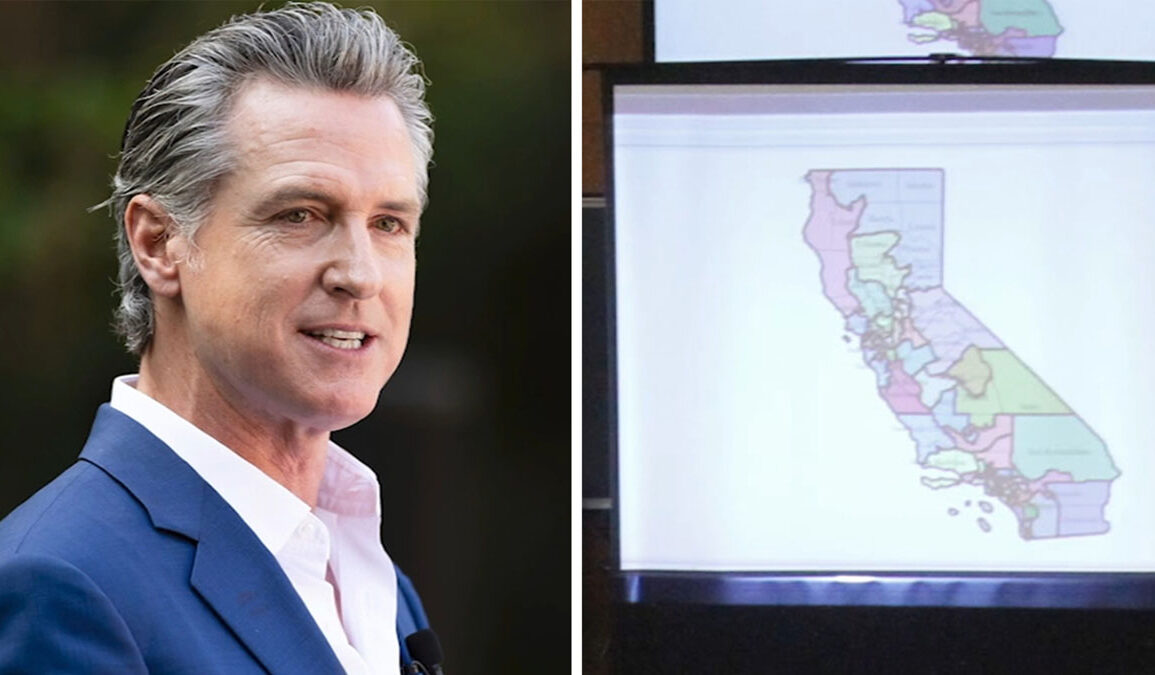California Governor Gavin Newsom has placed a bold wager on Proposition 50, a ballot measure that would allow Democrats to redraw California’s congressional districts. Yet the Wall Street Journal argues that the gamble will almost certainly fail. Writing in the Journal, Kenneth Khachigian warned that “Californians, always reluctant to vote ‘yes,’ will recoil at the governor’s self-serving partisanship.” He noted that ballot measures in the state often collapse under skepticism, especially when voters believe politicians are trying to grab more power for themselves.
Khachigian believes Newsom has “poked a stick into a hornet’s nest,” awakening a motivated opposition that will be better funded, better organized, and better positioned to turn the electorate against him. Proposition 50, he wrote, “threatens to smother the California GOP” but will instead have the opposite effect: rallying Republicans, independents, and good government advocates who distrust political manipulation of voting districts.
Proposition 50 is designed to suspend California’s independent redistricting commission and replace its maps with a partisan plan. Newsom says this is necessary to counter former President Donald Trump’s push for redistricting in Texas, where Republicans are expected to redraw maps to add five congressional seats to their column. In response, California Democrats argue they must fight back in kind.
The proposed maps would be a dramatic shift. Democrats, who already hold 43 of California’s 52 seats, would likely capture five more by flipping Republican districts and tightening control over three additional swing areas. Assemblymember Josh Lowenthal defended the move as essential, saying, “It’s imperative that Californians have a voice in selecting the political party that controls Congress in 2026.” At a press conference Newsom declared that Democrats had “tried to hold hands and talk about the way the world should be” but could not afford to remain passive. “We can’t just think differently, we have to act differently,” he said.
The stakes are significant. If the maps are approved, Republicans could be reduced from 9 seats out of 52 to as few as four. That imbalance is striking given that Democrats make up about 45 percent of California’s registered voters. To many, the idea of giving Democrats nearly 92 percent of the congressional delegation seems indefensible.
The Wall Street Journal argues that the measure is structurally weak from the start. Early polls show Proposition 50 attracting 46 percent support, with 36 percent opposed. Khachigian notes that such numbers are “a weak starting point when an opposition campaign has only modestly begun unleashing negative media.” Drawing on experience, he recalls that a 1993 school voucher measure polled at 45 percent in September but collapsed to just 30 percent on Election Day. The lesson, he argues, is clear: “If voters have any skepticism or uncertainty about a policy, they tend to choose the status quo rather than voting for something new or questionable.”
The Financial and Political Backlash
The financial costs of the special election are also a target for opponents. Assemblyman Carl DeMaio, a Republican, estimates that taxpayers will foot a $250 million bill for what he describes as Newsom’s personal campaign for higher office. Critics argue that a quarter of a billion dollars could be better spent on pressing needs. Khachigian suggests the “No on 50” campaign should emphasize that money could hire “firefighters, police officers, schoolteachers and road repairs” instead of underwriting partisan gamesmanship.
Meanwhile, powerful figures have lined up against Newsom. Former Governor Arnold Schwarzenegger, who championed the independent commission more than a decade ago, has emerged as a leading critic. Philanthropist Charlie Munger Jr. has pledged more than $10 million to defend the reforms his father supported. Former House Speaker Kevin McCarthy is attempting to raise $100 million to fund the campaign against the measure. Their involvement ensures that Newsom will not be able to define the issue on his terms alone.
Independent watchdogs are also undermining Newsom’s arguments. Common Cause, while not officially taking a side, said plainly, “Common Cause will not endorse partisan gerrymandering.” The League of Women Voters went further, declaring, “Governor Newsom is ‘dead wrong’ on the League of Women Voters. We are aligned with voters. Period. . . . Gerrymandering is a threat to democracy, regardless of who does it.”
These statements, Khachigian noted, are “language that Proposition 50 opponents are sure to use in campaign ads.” By placing himself against organizations widely respected for neutrality and fairness, Newsom has weakened his position and given opponents material to question his motives.
Why the Wall Street Journal Sees Defeat Ahead
Khachigian concludes that Proposition 50 is unlikely to survive the scrutiny of California voters. He argues that Newsom’s insistence the maps are temporary is as unbelievable as “the government’s assurance of shorter wait times at the Department of Motor Vehicles.” In his view, the measure is not about defending democracy but about “a shameless personal abuse of government to gild his credentials for his presidential ambitions.”
The central problem, according to the Journal, is that Californians may not accept a redistricting plan that produces outcomes so far removed from the state’s political makeup. Khachigian sums it up with a metaphor: “The share of California voters registered as Democrats is 45%, but Mr. Newsom’s gerrymander would give them as much as 92% of the congressional delegation. It’s the perfect bargain—they peel only a small portion of the potatoes but enjoy nearly all the french fries.”
California voters will decide Proposition 50 on November 4. Between now and then, they will be bombarded with arguments from both sides. But if the Wall Street Journal is right, the combination of voter mistrust, organized opposition, financial costs, and the unpopularity of political gerrymandering will doom Newsom’s plan.
As Khachigian wrote, “Stay tuned for the heavy artillery.”
NP Editor: This is very consequential, a shift of that size would change the balance in Congress for a long time. But Texas did it successfully, and the play is revenge. But the WSJ is right, big checkbooks will come out for this.








